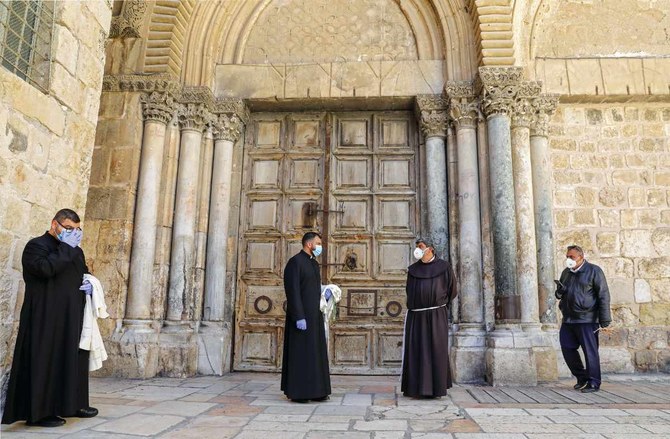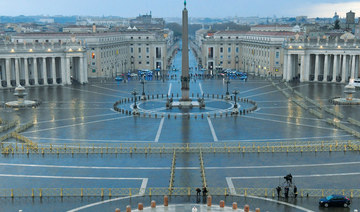AMMAN: From Italy to Palestine, plans for the Holy Week, which marks the end of 40 days of the Christian Lent fast, have been thrown into disarray by the global coronavirus pandemic.
For the first time in centuries, rituals in the Old City of Jerusalem will either be cancelled or held without the faithful as a precautionary measure against the spread of the coronavirus disease (COVID-19).
The pandemic has forced humanity to deal with unprecedented challenges, according to Father Atallah Hanna, the Orthodox archbishop of Sebastia.
“The world has united in this suffering. Like in other countries, precautionary measures have been taken in Palestine and Jordan,” he told Arab News.
The Catholic Church has been forced to embrace 21st century digital technological tools to transmit images of Holy Week events.
By Hanna’s own admission, to hear church services via Facebook is not the same as holding the service in person.
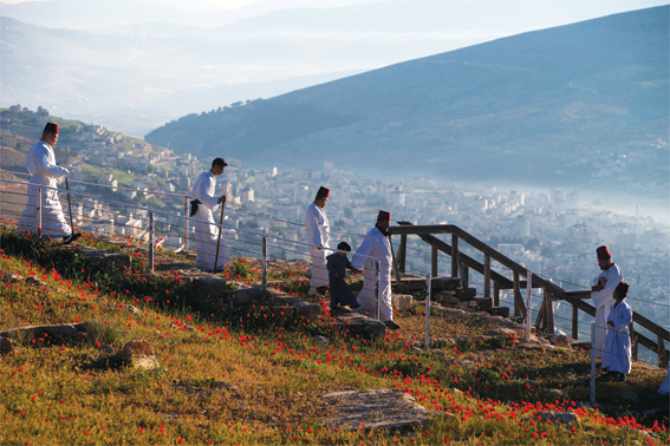
Samaritan worshippers typically take part in a Passover ceremony at Mount Gerizim, near the northern West Bank city of Nablus. This will be called off due to coronavirus. (AFP/file photo)
“It also means being denied the ability to accept the Eucharist from the priest,” he said.
“But this is an unprecedented situation. We need to heed the advice of the health experts and government for the protection of lives."
According to Father Issa Musleh, spokesman for the Orthodox Patriarchate in Jerusalem, the oldest Christian church, Easter-related church services will be held in the Old City as usual but with very few attendees.
“A very small number of priests, nuns and singers will carry out the religious rites with the help of multimedia,” he told Arab News.
“We will make sure all believers are able to follow the various church services leading to the culmination of religious events with the celebration of the resurrection on holy Easter Sunday.”
However, one particular church ceremony, Sabt Al-Nour (The Holy Light or Holy Fire), cannot be conducted virtually.
COVID-19 IN PALESTINE
266 coronavirus cases as of April 10
44 recoveries
1 death
Orthodox tradition has it that a blue light glows from the stone bed where Jesus was said to have been buried.
According to this belief, the light emanates on the Saturday before Orthodox Easter from the Church of the Holy Sepulcher in the Old City and is meant to be spread around the world.
“Arrangements are being made to send the light to all Palestinian towns and villages without the usual crowds and boy scouts,” Musleh said.
“We are also working jointly with governments, air-transport companies and the Israeli Ministry of Religious Affairs to ensure that the holy light is carried from Jerusalem to the four corners of the world — just as it has been done every year for centuries.”
As for Bethlehem, where the West Bank’s first confirmed COVID-19 case was reported, Father Salem said the situation in the governorate has recently improved.
“There have not been any new cases since the first wave that came to us from Greek tourists,” he said, referring to Bethlehem, which has a significant Christian population. Its Church of the Nativity draws thousands of pilgrims every year.
“All those who were under quarantine have recovered and no new cases have been recorded.”
A COVID-19 patient told Arab News he and his family went through difficult times but emerged healthy and healed.
Reverend Bassam Bannoura of Beit Sahour, a town east of Bethlehem, said he had had dinner with members of a family who were unaware they had the virus.

Samaritan worshippers typically take part in a Passover ceremony at Mount Gerizim, near the northern West Bank city of Nablus. This will be called off due to coronavirus. (AFP/file photo)
After a period of self-isolation and multiple tests, Bannoura said, he has been declared free of the infection.
Bannoura added that he is confident that his wife and son, who have also tested positive, will make a full recovery.
Father Hanna Salem, a Latin priest in Beit Jala, said that in strict compliance with the government’s requirements, all churches in the mainly Christian town will remain closed to parishioners.
“Only priests, nuns and church singers will be taking part in the events. On Easter Sunday we will all follow the broadcast on Palestine TV by the Latin Patriarchate from Jerusalem,” he told Arab News.
The mood in Ramallah, the center of the Palestinian government, is just as somber.
Xavier Abu Eid, a Catholic churchgoer, told Arab News that priests from all Latin churches in the governorate will celebrate together in a single service that will be broadcast on the abouna.org website.
The Easter situation in neighboring Jordan is no different as the country battles its own COVID-19 outbreak.
Rev. Ghaleb Kawar, pastor of the Fuhais Pentecostal Evangelical Church, said his group is preparing to replace Palm Sunday and the Passion Week rituals with online events.
“We need to turn our homes into churches,” he told Arab News.
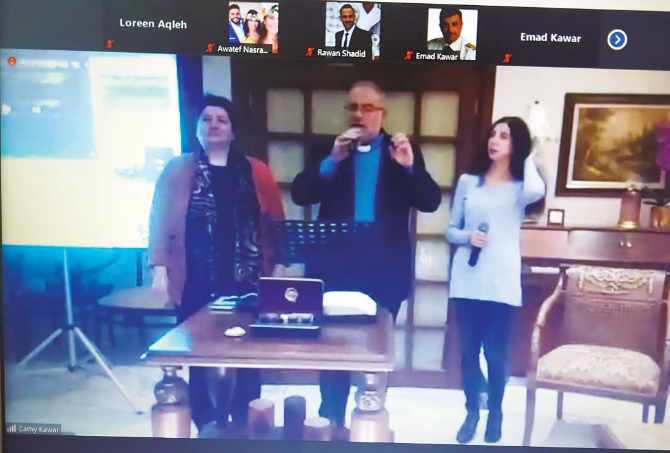
Ministers of Fuheis Pentecostal Church in Jordan conducting services using Zoom. (Supplied by Rev. Ghaleb Kawar)
“I told my team to reproduce videos from last year’s Palm Sunday celebrations to remind worshippers of the events that happened 2,000 years ago when Jesus entered Jerusalem.
“We asked them to record short videos about the passion week and Good Friday while preparing uplifting songs to be broadcast on Easter Sunday along with a short sermon.”
Kawar has also asked Sunday school teachers to record short videos to be sent to children in order to calm their minds.
“We want to relate the Easter story to the current situation to reassure them that this is not war and the government is protecting us,” he said.
Issam Ghattas, founder of Gilad camp, which organizes church picnics for Jordanian Christians on Palm Sunday, believes 2020 will be a year of sorrow.
“Something is missing this year because we can’t enjoy the spring,” he told Arab News.
“Palm Sunday for us is about children and families getting together in a mood of celebrations as we sing ‘hosanna’ and remember the first Palm Sunday in Jerusalem, waving palm and olive branches.”
Ghattas’ views were echoed by Wafa Gousous, director of the Amman office of the Middle East Council of Churches and the Orthodox Initiative.
She noted that Christians have no option but to carry out church services virtually during this Easter.
“Churches are closed. Church masses are being done through the priest in churches but no one is allowed to attend,” she told Arab News.
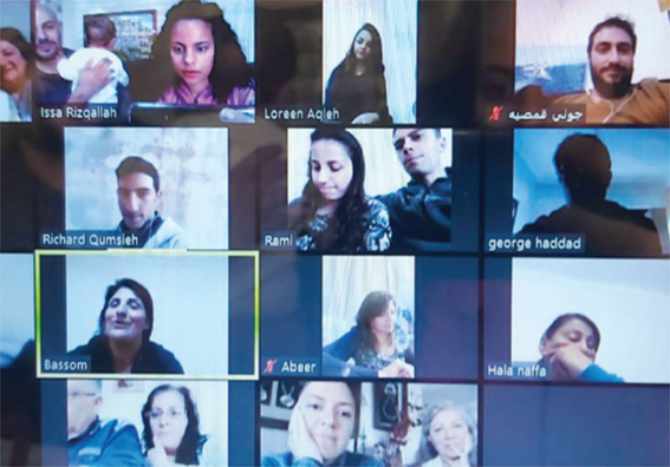
Members of Fuheis Pentecostal Church in Jordan attending services using Zoom. (Supplied by Rev. Ghaleb Kawar)
“We are forced to participate in church services by watching them on our mobile phones.”
Gousous said there is a deep pain in every Christian heart anticipating the Resurrection.
“Christians in Jordan, like their compatriots of other faiths, are committed to staying home and abiding by the government laws,” she said.
“We remain hopeful that something will happen and this virus will suddenly disappear.
On a more hopeful note, Gousous said: “I pray that our tears can create a river that will lead us to remember the joy of the Resurrection.
“We want to respect the health requirements and the efforts of our government.
“At the same time, we are looking forward to the happiness of the Resurrection and humanity’s rise from its beds and rooms into a better life.”






